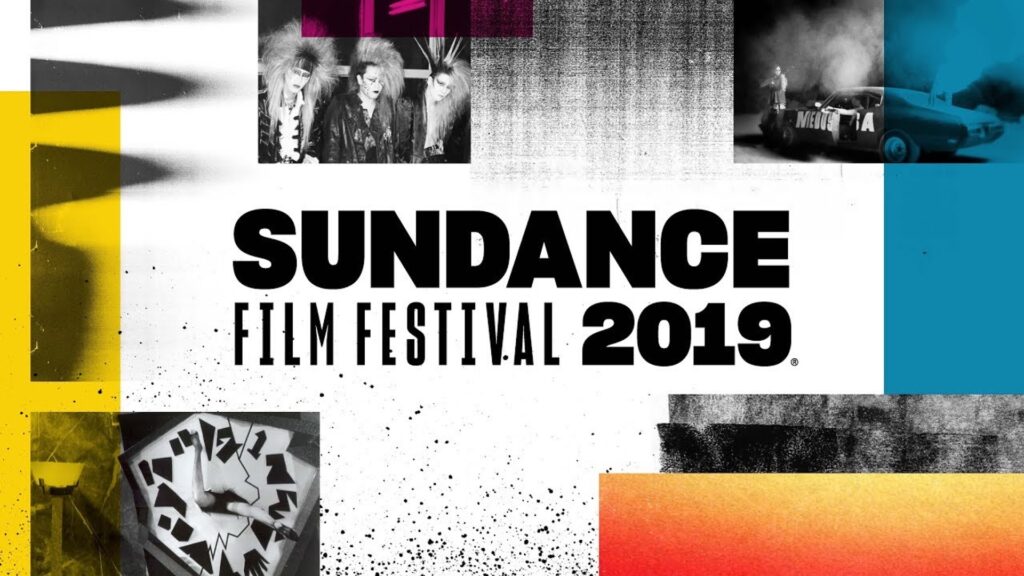
This year, I had the pleasure of attending the Sundance Film Festival for the first time. To put it bluntly, it was one of the most incredible experiences of my adult life. I have spent many patient years jealously soaking up Sundance hype, and pining for films I wouldn’t be able to see for months. To finally attend the festival was incredibly surreal.
On the evening before the festival’s final day, Sundance gives out a series of awards to films that excel in various areas. Somehow, I managed to miss every single one of the award winners. At the same time, the movies I did manage to see were mostly exceptional, and while not all of them will achieve significant buzz throughout the year, that doesn’t mean they’re not worth looking out for. A part of me counts this as a great success, because very few of the films I had the chance to see will be immediately available in the same way that Brittany Runs a Marathon, The Report, and Late Night will be. Those names probably don’t sound familiar now, but they will.
Here’s what I did catch at the festival:
Bedlam
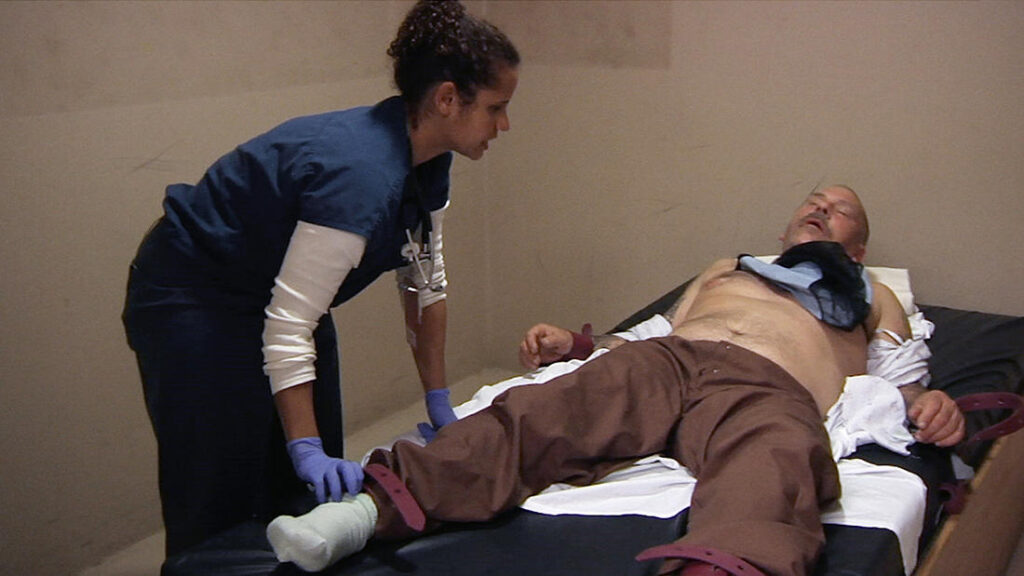
Because I really wanted to see something as soon as possible on the day I arrived, my friend and I picked this one sort-of at random. Bedlam is a documentary that concerns the various inadequacies of America’s mental health system, and it pulls no punches. The director tours emergency rooms, jails, and homeless camps, and highlights the journeys of several individuals affected by the shortcomings of these institutions. There’s a specific emphasis on bipolar disorder, and some exceptionally raw footage of patients going through severe manic episodes. The documentary also takes an unflinching look at how law enforcement deals with mentally ill individuals, and the frequent mistreatment that usually arises from a lack of understanding.
The director, Kenneth Paul Rosenberg, is a psychiatrist. After he began filming the documentary, he made the decision to include the story of his sister’s struggles with mental illness, adding a personal touch. He did a brief but interesting Q&A after the film. One audience member pointed out that the film talks about so many inadequacies in our systems, but by the end, offers no concrete solutions. The director was quick to acknowledge this, stating that his primary intent was to spread awareness, because the changes needed to create a better system of mental health care will never happen until we educate the public that these issues even exist in the first place.
Much of Bedlam explores its topics in a scattered, surface-level way. There’s enough going on here to support five documentaries, but as a piece that focuses almost exclusively on illuminating various aspects of this crisis, it works quite well. I believe this one is supposed to air on PBS sometime in the future, so keep an eye out. It’s definitely worth watching.
7.5/10
Corporate Animals
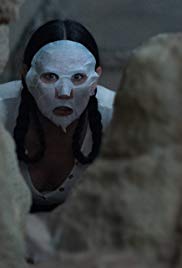
During the festival, I spent an inordinate amount of time complaining about how much I hated this film. I had an advance ticket to this one, and was looking forward to it because of the synopsis and the accompanying still image, seen above. Based on the information provided, I was expecting a pitch-black horror/comedy in the vein of The Belko Experiment or perhaps Battle Royale. What I got was more akin to a mainstream comedy with a few horror elements, and for the most part, it didn’t work for me. My expectations almost certainly tainted my experience, but at the end of the day, it just wasn’t my kind of film.
Demi Moore stars as a vindictive boss who takes her employees on a team-building trip with the intention of taking the group on a tour of a cave. Her competitive spirit kicks in, and she makes the executive decision to lead them through the “advanced” cave, in spite of the misgivings expressed by their tour guide, played by Ed Helms. The entrance to the cave collapses shortly after they arrive, and the trapped employees very quickly turn on each other, resorting to cannibalism. It’s more light-hearted than it sounds, for better or worse.
A majority of the cast (minus Demi Moore) showed up for the Q&A, including Ed Helms. The casting was easily the strongest part of the film, and it was apparent that much of the dialog was improvised. There are definitely some jokes that land, and it’s not altogether unwatchable. General audiences will probably enjoy this film just fine. However, as for my opinion…
3/10
The Wolf Hour
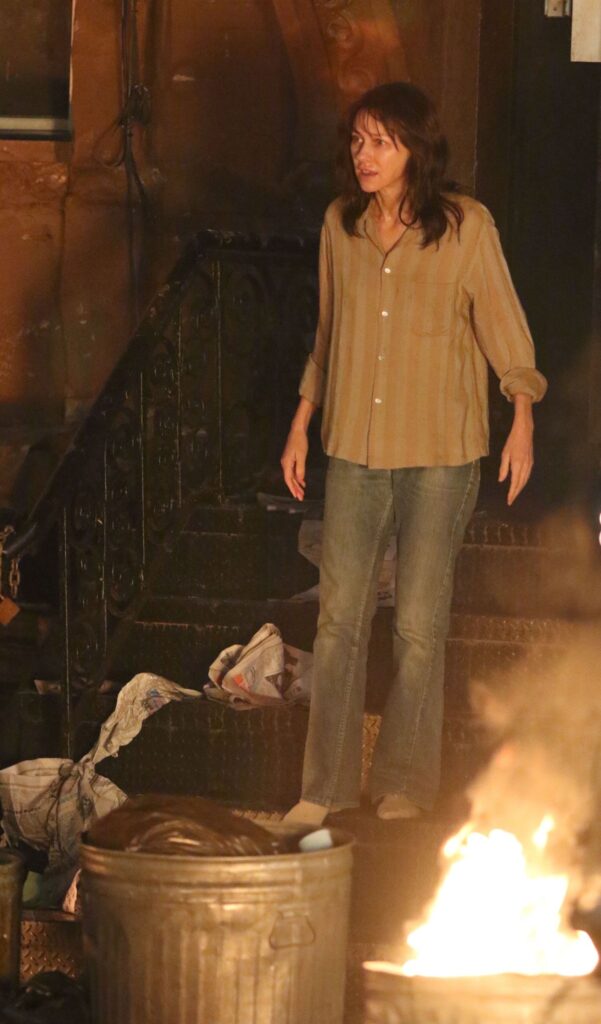
The Wolf Hour is a single-setting thriller starring Naomi Watts as a seriously agoraphobic author with writer’s block. She lives in her grandmother’s former apartment in a dangerous part of New York City during the “Summer of Sam,” and the film highlights the paranoia of that era. Watts’ character is being harassed by an unknown individual who rings her buzzer several times a night, contributing to her disintegrating mental state. As various people reach out to either help or harm her, she must face the reality of her situation.
Watts’ performance is really the highlight here. In early portions of the film, she’s nearly unrecognizable as she disappears into the role of a woman who feels threatened by even the most insignificant things around her. The camerawork was creative enough to support 100 minutes in a single apartment without ever becoming dull. The ending will certainly make this a polarizing experience, and many of the audience members at our screening were dissatisfied. I loved every minute of this tense thriller, and will likely watch it again when it comes out officially.
9/10
Divine Love

It might have been useful to do a little research on Brazilian politics before seeing this one, but regardless, this was definitely one of my favorite films of the festival. Set in 2027, Divine Love is about a not-so-distant future in which the separation between church and state in Brazil has dissolved in some very odd ways. In my opinion, the film does a great job of world-building; there are drive-thru pastoral services, 1984-esque government offices, and neon-soaked worship services that resemble ecstasy-influenced raves.
The plot concerns a devout Christian named Joana. She works at the government office in charge of filing divorce proceedings, and moonlights at an organization called Divine Love that aims to repair marriages through a series of bizarre religious rituals, with a particular emphasis on fertility…and apparently wife-swapping. As Joana and her husband try desperately to have a child, their strained relationship becomes increasingly volatile.
Like most of the films on this list, this is another one that will likely be polarizing, and just who the film is aimed at isn’t entirely clear. While it’s certainly a criticism of some aspects of mainstream Christianity and the complications that can arise amidst the de-secularization of government, it’s not wholly anti-theistic. This is certainly an interesting perspective, but considering the large amount of graphic nudity present, its niche would seem to be astonishingly narrow. If nothing else, the film is well-acted and undeniably gorgeous, with a saturated blue and pink color scheme meant to represent this futuristic society’s black-and-white view of gender. I can say this with confidence, because this interpretation of the film’s colors comes straight from the director’s mouth.
During the Q&A with the writer/director, one audience member in the back raised her hand and asked, “What are we supposed to take away from this film?” He was understandably evasive when answering this question, essentially re-explaining the premise.
This is probably the worst question one could possibly ask of any filmmaker, a Q&A cardinal sin. When someone sets out to write a film and has a very specific vision for the project, the last thing that individual usually wants to hear is an audience member express, in a roundabout way, that they didn’t “get it.” It implies a failure to communicate on the part of the artist (although in this case it was clearly the failure of a single audience member to pay attention.) There are of course less straightforward films that are intentionally vague and open to various interpretations. In that scenario, a question like the one asked is just as useless, and displays a degree of ignorance about the nature of art itself. If you ever find yourself in the position to ask an artist about their art, don’t ask them to interpret it for you.
Mentioning Divine Love at Sundance was, on several occasions, an invitation for debate. I met so many people who were still trying to wrap their minds around the film. At one point while standing in line, a group of about eight people including myself spent a full ten minutes debating the merits of the film and the validity of its message. A few absolutely hated Divine Love, and almost felt betrayed by it, citing its sex scenes as unnecessary and its world-building as flimsy at best, two perspectives I vehemently disagree with. This conversation made me wonder if we’d all seen the same movie. Divine Love definitely tended to elicit a strong response, and while it wasn’t universally loved at the festival, it was frequently discussed. It’ll stick with you whether you enjoy it or not, and as far as I’m concerned, that alone indicates some level of success. I look forward to future conversations about this film when it’s more readily available.
9/10
Koko-Di Koko-Da
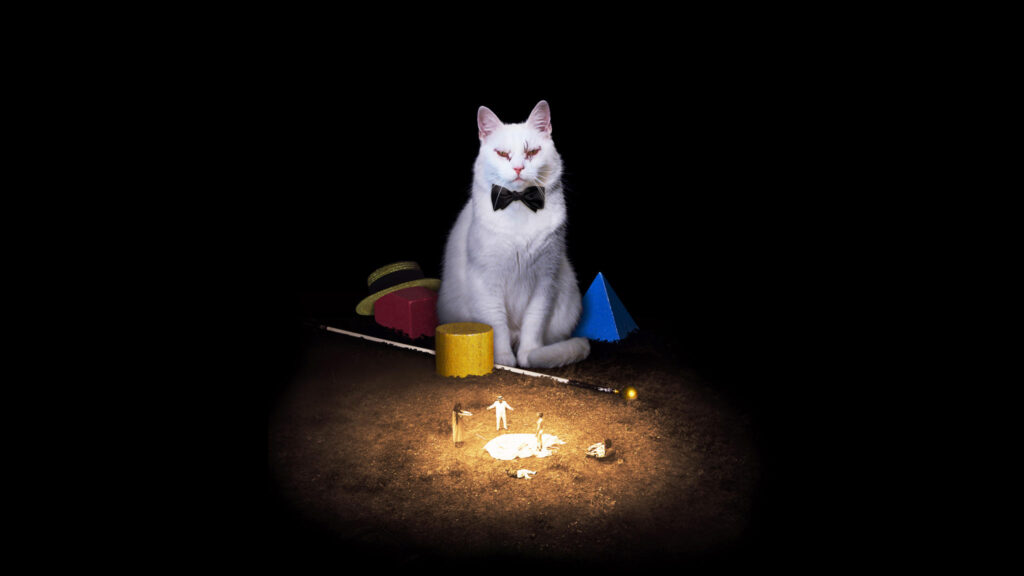
Easily the most mispronounced movie of the festival (It’s Koko-dee, Koko-day), this Swedish/Danish production was one of my more anticipated films. Unlike Corporate Animals, this one did not swiftly spew diarrhea all over my expectations.
At the most basic level, Koko-Di Koko-Da is about a couple on vacation attempting to mend their relationship after the loss of a child. The couple decides to camp in the woods, and they awaken in the morning to find three strange, sadistic individuals who torture them physically and psychologically over the course of the film. The story breaks twice for shadow puppet sequences that provide insight into what’s going on, a device that worked well in my opinion. The style of these scenes is ripped from a short film the director released several years ago called Dreams from the Woods, which I have yet to track down.
Very little of the film feels grounded in the real world, as the director tried to capture the aesthetics of hypnagogia, the state of being between wake and sleep. This surreal quality makes it quite a unique experience, and while the allegory at play was certainly obvious, it never cheapened the film, at least not for me. It never gets bogged down by constant attempts to reiterate and explain its allegory to the audience like, for example, Avatar’s excruciatingly obvious parable about the effects of colonization on Native Americans, or The Matrix‘s nauseating Christ metaphors. It was an intellectually respectful film, a quality I appreciate, and generally tend to find more often in little foreign films like this one.
The strangest part of my Koko-Di experience at Sundance was the audience. There’s definitely a little slapstick in the film, but it seems to exist strictly to provide an uncomfortably off-kilter atmosphere. The crowd around us laughed uproariously at some really perplexing moments, and it was an extremely lively crowd. There was more laughter at this screening than at the one for Corporate Animals, and while the latter failed to be funny most of the time, I’m still unsure as to why our audience responded to Koko-Di Koko-Da like it was the laugh riot of the century. I understand the concept of uncomfortable laughter, but our theater was so loud that I was thankful for the fact that it was a foreign film requiring subtitles. Otherwise, I’d have missed significant portions of the film.
As far as distribution is concerned, I really have no idea when general audiences will have a chance to catch this one. It’s currently making the rounds at various festivals, so don’t expect to see this around anytime soon. Then again, nothing seems to be set in stone, so this could turn up on Netflix tomorrow for all I know.
7.5/10
Hail Satan?
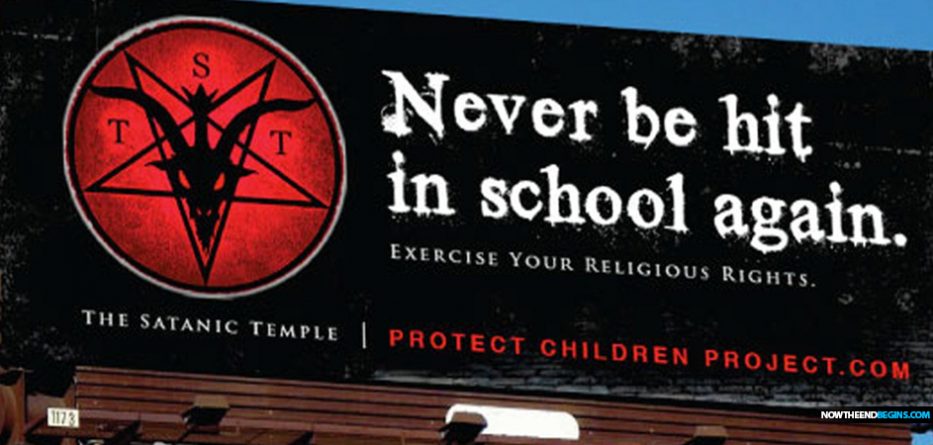
Another film that was funnier than most straightforward comedies I’ve seen in recent times, the documentary Hail Satan? was goddamn hilarious. It concerns the rise of the Satanic Temple and their advocacy efforts, a story I’ve been following off and on ever since an incident in Arkansas that made headline news, in which they attempted to erect a statue of The Baphomet right next to a statue of the Ten Commandments on a small town’s courthouse lawn.
The documentary includes lots of blurred faces, but mostly follows The Satanic Temple’s most prominent spokesperson, Lucien Greaves, a shy, private man who wanted nothing more than to promote religious pluralism. A sort of politically-inclined and organized off-shoot of the Church of Satan founded by Anton LaVey, whose ideas were more influenced by Ayn Rand and Nietzsche than the devil himself, The Satanic Temple has really only risen to prominence in the past five to ten years, eventually setting up headquarters, appropriately, in Salem, MA.
The Satanic Temple’s notoriously theatrical stunts keep the first 2/3 of this documentary extraordinarily engaging and entertaining, and when things get a bit more serious by the end, you really understand their perspective and general motivations. For those unfamiliar with the story of this organization, Hail Satan? should serve as an enlightening experience, and if you’re at all passionate about that division between church and state, you may find yourself identifying with their cause more than you might expect.
8.5/10
Little Monsters
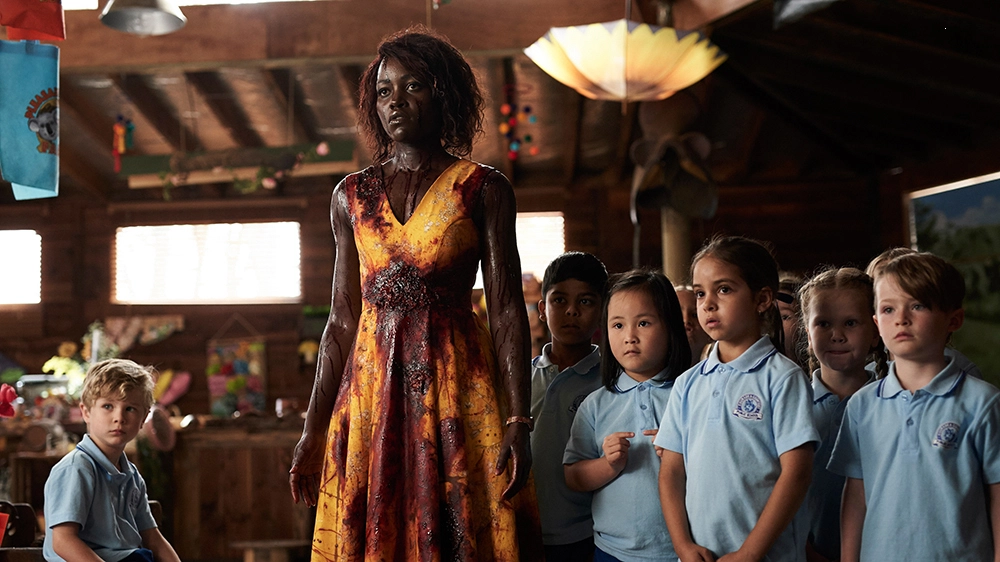
The Australian Little Monsters is a zombie comedy that just may be my favorite entry in the sub-genre since 1985’s The Return of the Living Dead. I’ve never been a huge Shaun of the Dead fan, and really that one is a more apt comparison, but this movie worked for me in so many ways.
The film concerns an immature burn-out, Dave, who leaves his longtime girlfriend and is forced to live temporarily with his sister and her young son Felix. Dave takes Felix to school one day, and becomes extremely infatuated with Felix’s kindergarten teacher Miss Caroline, played by Lupita Nyong’o. After Dave volunteers to help chaperone a class field trip to a petting zoo, the nearby “generic government testing facility” accidentally unleashes zombies, and Dave and Miss Caroline must work together to keep the class alive and calm.
I had a fantastic time watching this movie, and I really hope this gets mainstream distribution soon. The casting is great, especially that of Lupita Nyong’o, who proves to be a major badass by the end. Josh Gad, an actor who has annoyed the hell out of me for years, is finally cast in the perfect role as the disgruntled and cynical host of a children’s TV show, trapped with the group at the petting zoo’s souvenir shop. He’s an absolute asshole, and one of the funniest parts of the film.
Much of Little Monsters concerns the various methods the creative Miss Caroline uses to protect the children. She attempts to convince them throughout that the zombies are all part of a game, and she’s very good at being upbeat enough to make this believable to a child. This is a major source of humor, and it goes to some wildly entertaining places. It’s all fairly lighthearted given its subject matter, and it’s a movie that will likely appeal to a pretty broad audience.
7.5/10
Dirty God
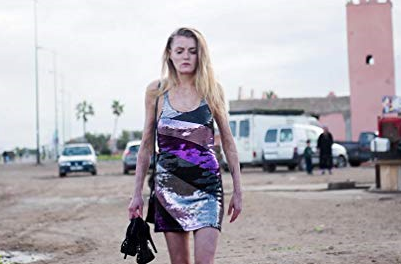
Dirty God is an exceptionally pretty film about a young single mother named Jade who is severely disfigured after an unfortunate encounter with her abusive ex and a vat of acid. After several surgeries, her face and body mostly heal, but she has serious scars on one side of her face and all over her upper body. Jade’s doctors refuse to operate further, as any more surgery would be purely cosmetic and potentially counterproductive to the progress she’s already made, but as her self-esteem takes a nosedive, she seeks out an alternative plastic surgeon in Morocco that she finds through a sketchy internet banner ad.
There are aspects of Dirty God’s plot that are predictable and sometimes downright unnecessary, but the film is held together well by the lead actress’s performance and the cinematography. Shockingly, this is Vicky Knight’s first ever role in a film, and her dynamic character is dazzling to watch on screen. The director has a unique sense of shot composition as well. For example, the opening credits sequence is accompanied by extreme close-ups of Jade’s disfigured face, and it’s filmed in such a way that it looks like a beautiful otherworldly landscape. The movie also dares to touch on how her trauma impacts her performance as a mother, and it’s pretty heartbreaking.
Dirty God is definitely one of those movies that involves an immature main character who makes terrible choice after terrible choice, and for some this will probably be rather frustrating. Aside from the moments when the film digresses into a story about an uninteresting love triangle, I found every moment absolutely enthralling, and I felt for the main character in ways I didn’t expect to.
8/10
The Hole in the Ground
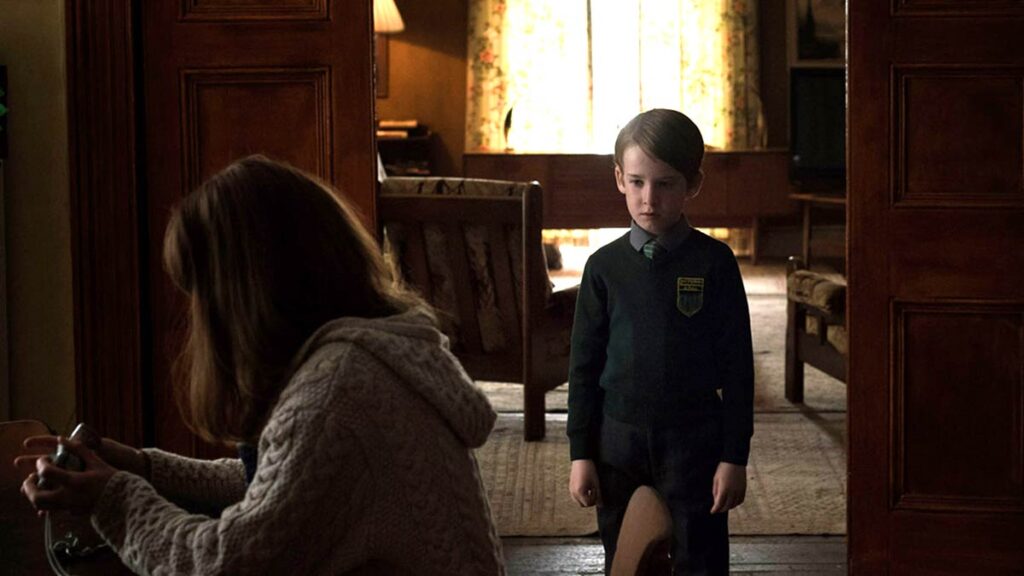
I sincerely hope A24 keeps up the momentum it’s built over the last several years, and if The Hole in the Ground is any indicator, it seems that 2019 will be smooth sailing for the revered production company. The film concerns a mother and her young son as they move to a quiet little community in the country after the parents decide to separate. Near their property, in the middle of a forest, is a large hole in the ground. One evening, the mother suspects that her son has escaped and entered the hole. When he returns, his behavior is just a little different, and she quickly suspects that this child may not be her son anymore.
Building on age-old tropes regarding doppelgangers and identity, The Hole in the Ground manages to be a compelling, if derivative take on the concept. I expected this movie to go a little further than it did, but on the whole, I can’t really say it disappointed. It was thoroughly entertaining, and had just enough twists to keep the audience engaged.
7/10
Sweetheart
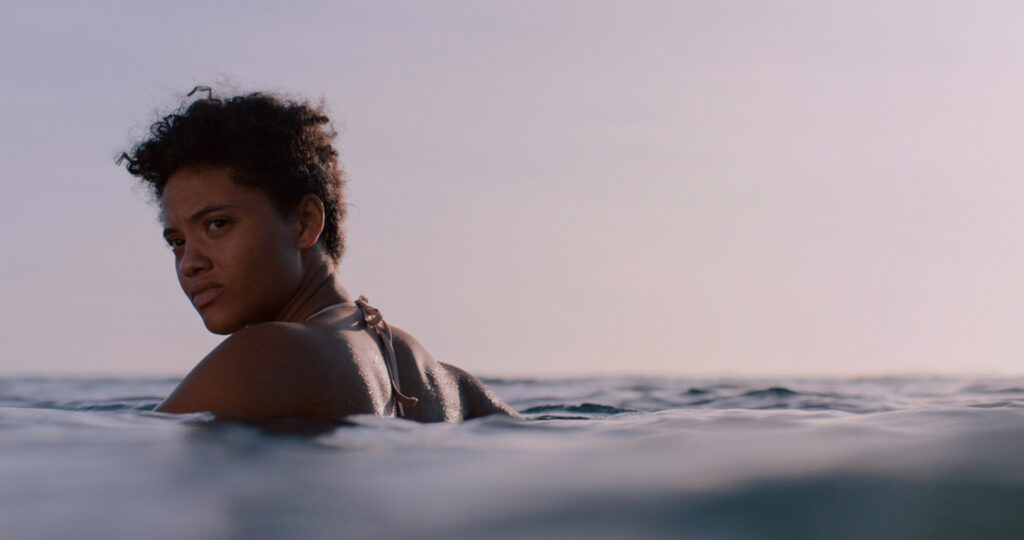
I remember a time when Blumhouse was almost as disreputable a distribution company as The Asylum, the people behind mock-busters like Transmorphers and The Day The Earth Stopped. To think that this company is now picking up critically-acclaimed films like Get Out is absolutely absurd, and they seem to have really gotten their act together.
Sweetheart comes to us from J. D. Dillard, a director who received significant buzz after he released the film Sleight back in 2016. It’s about a woman named Jenn, stranded on a deserted island. At night, a fish-man-like monster emerges from a hole in the bottom of the ocean to feed, hunting Jenn. She decides to fight back. Let the jokes about “The Shape of Water gone wrong” ensue.
A good portion of this film is just Jenn alone on a deserted island, and while the middle of the film introduces a couple of other characters, the movie is at its best when we’re watching her prepare for the next attack. The lead performance is definitely notable, and Jenn is the opposite of the lame, helpless women we normally see in horror films. Aside from what I’ve said already, it’s probably best if I keep my mouth shut regarding any other plot points, so just know this one is coming.
Also, J. D. Dillard may be directing yet another remake of the Vincent Price classic, The Fly.
7.5/10
Wounds
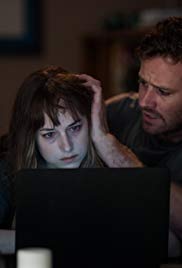
It took me quite a while to even begin to form an opinion on this one. It’s certainly a competent film with a great cast (Armie Hammer, Dakota Johnson, Zazie Beatz), but its plot is really odd, and the whole film left me rather uneasy, more than anything because it ends so abruptly. At first, I thought there were definitely too many unanswered questions, but the more I think about it, the more I realize the film did exactly what it set out to do, and gave us about as much information as it could. After sitting on the film for a while, I can say with confidence that I loved it.
Wounds is an atmospheric horror film from the director who brought us Under The Shadow, a Persian horror film that almost nobody in America cared to see. Will (Armie Hammer) and Carrie (Dakota Johnson) are a couple having relationship problems. Will owns a bar, and is having an affair with his coworker Alicia (Zazie Beatz). One evening, four upper-middle-class teens arrive at Will’s bar with fake IDs and awkwardly order “beers.” Knowing full well that they’re definitely underage, Will serves them anyway. That night, a major fight ensues at the bar, and the teens flee, leaving behind a cell phone. Will is able to deduce the phone’s lock-screen pattern by looking at the smudges on the screen, and finds some incredibly disturbing pictures and footage that he can’t unsee. He begins to receive threatening text messages and phone calls, and it becomes clear that Will is now involved in a supernatural shit-show he never asked for.
Armie Hammer and Dakota Johnson are really, really exceptional in this film. Their characters are constantly on the brink of total insanity, and when they “aren’t quite themselves,” they’re pretty terrifying. I haven’t heard any distribution rumors about this one, but I can’t imagine that it’ll fade into obscurity. It’s far too much fun for that.
7/10